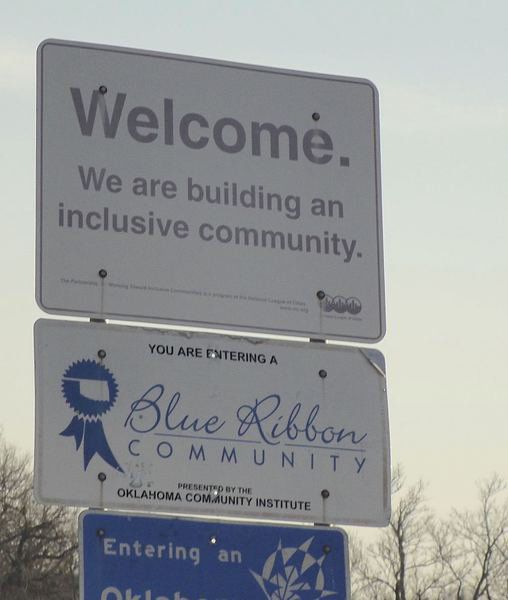“Peace be upon you” is a typical Islamic greeting, but some members of Norman’s Islamic community feel they are being blamed for the violence of extremist terror groups.
Hostility toward Americans of Middle Eastern descent has increased since the presidential campaign, they say. Now, with the issuance of a presidential order banning travel to the United States by people from Iran, Iraq, Libya, Somalia, Sudan, Syria and Yemen, many fear seeing friends deported, having family members forbidden to visit or becoming the subject of racially motivated attacks.
“I’ve lived in Oklahoma since 1978 and ever since I’ve lived here, my wife has worn hijab to cover her hair,” said a Norman businessman of Iranian descent who spoke on condition of anonymity for fear of being targeted. “In the past 40 years, no one had ever shouted at us. For the first time during the election when we were going in our neighborhood for a walk, there were two kids who just shouted and screamed at us.”
He believes comments made on national media by President Donald Trump during his campaign encouraged people to show hatred toward Muslims and those of Middle Eastern lineage.
“It’s a very uncomfortable situation when your Americanism is being questioned by another American,” he said. “We fight for this country. We work for this country. It’s unfounded hatred. We can’t believe what’s happening to us.”
At several points of entry to Norman, signs read, “We are building an inclusive community.”

Several signs, including this one on 12th Avenue Northeast just south of Indian Hills Road welcome people to Norman, an “inclusive community.” The signs were posted as part of an Inclusive Community Initiative in 2009-2010.
The signs were part of an Inclusive Community Initiative the city undertook during 2009-2010 with the cooperation of the Norman Chamber of Commerce and the University of Oklahoma.
“Part of our city’s intent is that Norman welcomes everyone who comes here to live, to go to school and to work,” said Kay Ham who chairs the city’s Human Rights Commission. “The diversity is exactly what shows that we are a vibrant city where businesses want to locate because we’re welcoming of everyone. People want to send their kids to school in Norman because it’s a welcoming community. That’s the way I see it.”
That’s also the way Norman’s residents of Middle Eastern-descent — whether Muslim, Christian or other — have seen the city most of the time, but as a university community with international students and professors gleaned from around the globe, the travel ban is particularly troublesome.
“There are several professors at OU and OSU from the seven countries who are in the process of receiving their green cards, and if they leave the country, they cannot come back,” the Norman businessman said. “It created a mess for students who left the country — they can no longer come back for 90 days. It’s unbelievable. People are scared.”
Like many, he has family, many of them aged, who still live in Iran and sometimes visit.
“A lot of people that I know, their families used to come, their parents used to come,” he said. “Now even if they have a valid visa, they can’t come. It’s just sad.”
Norman resident Jackie Farley serves on the Human Rights Commission. She’s saddened by things she’s seen on social media recently that indicate longtime residents and American citizens are experiencing discrimination.
“Trying to make people afraid of others who aren’t like us is always disturbing to me,” Farley said. “I think that Norman’s better than that. I think we have to be a beacon of making people feel safe and welcome everyone and offer them protections. To me, it’s a human rights thing.”
Norman Mayor Lynne Miller agrees.
“Recent news about changes in U.S. immigration policy has sparked public controversy, fear and anxiety,” Miller said in a statement issued this week. “I want to reassure everyone that the values expressed by our Norman residents over and over and over, to value diversity and be inclusive and welcoming — regardless of race, ethnicity or religious faith — will not change because of this U.S. presidential executive order.”
In his executive order, Trump states that the purpose of the temporary ban is to protect U.S. citizens by making sure “that those admitted to this country do not bear hostile attitudes toward it and its founding principles. The United States cannot, and should not, admit those who do not support the Constitution, or those who would place violent ideologies over American law.”
The order decries honor killings and “other forms of violence against women,” along with persecution of religious minorities, and it further promises to “prioritize refugee claims made by individuals on the basis of religious-based persecution, provided that the religion of the individual is a minority religion in the individual’s country of nationality.”
While the order does make reference to “local jurisdictions,” Norman City Manager Steve Lewis told the city council via email that it doesn’t affect local law enforcement.
“I have consulted with city staff and they agree that this language does not require a change to any of the Norman Police Department’s current practices,” Lewis wrote. “While persons detained or arrested for committing other criminal offenses may be held for up to 48 hours while their immigration status is determined, NPD does not have jurisdiction to actively enforce federal immigration laws.
“Any queries regarding the process of incarcerated individuals and immigration status should be directed to the Cleveland County Sheriff’s Office.”
Miller said Norman will continue to be a friendly community.
“We all realize that most of us are not more than a few generations away from being an immigrant ourselves,” Miller said. “Norman is home to a sizable Muslim population, as well as many other practicing religious faiths. As Norman citizens, we celebrate our differences and see our diversity as a quality that makes us a livable place where people feel safe and accepted.”

